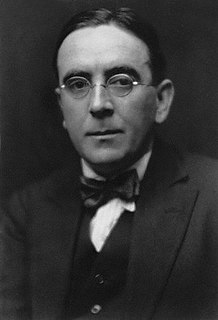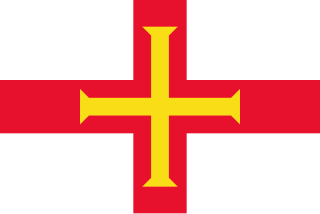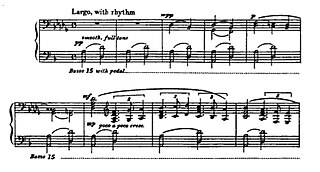Sarnia: An Island Sequence is a set of three pieces for piano solo composed in 1940–41 by John Ireland. [1]

John Nicholson Ireland was an English composer and teacher of music. The majority of his output consists of piano miniatures and of songs with piano. His best-known works include the short instrumental or orchestral work "The Holy Boy", a setting of the poem "Sea Fever" by John Masefield, a formerly much-played Piano Concerto, the hymn tune Love Unknown and the choral motet "Greater Love Hath No Man".
A performance takes about 20 minutes. The pieces are: [2] [3]
- Le Catioroc
- In a May Morning
- Song of the Springtides
Sarnia is an ancient Roman name for the island of Guernsey, one of the Channel Islands.

Guernsey is an island in the English Channel off the coast of Normandy. It lies roughly north of Saint-Malo and to the west of Jersey and the Cotentin Peninsula. With several smaller nearby islands, it forms a jurisdiction within the Bailiwick of Guernsey, a British Crown dependency. The jurisdiction is made up of ten parishes on the island of Guernsey, three other inhabited islands, and many small islets and rocks.

The Channel Islands are an archipelago in the English Channel, off the French coast of Normandy. They include two Crown dependencies: the Bailiwick of Jersey, which is the largest of the islands; and the Bailiwick of Guernsey, consisting of Guernsey, Alderney, Sark and some smaller islands. They are considered the remnants of the Duchy of Normandy and, although they are not part of the United Kingdom, the UK is responsible for the defence and international relations of the islands. The Crown dependencies are not members of the Commonwealth of Nations or of the European Union. They have a total population of about 164,541, and the bailiwicks' capitals, Saint Helier and Saint Peter Port, have populations of 33,500 and 18,207, respectively. The total area of the islands is 198 km2.
Le Catioroc is a neolithic site in Saint Saviour, Guernsey.
The Neolithic, the final division of the Stone Age, began about 12,000 years ago when the first development of farming appeared in the Epipalaeolithic Near East, and later in other parts of the world. The division lasted until the transitional period of the Chalcolithic from about 6,500 years ago, marked by the development of metallurgy, leading up to the Bronze Age and Iron Age. In Northern Europe, the Neolithic lasted until about 1700 BC, while in China it extended until 1200 BC. Other parts of the world remained broadly in the Neolithic stage of development, although this term may not be used, until European contact.

St Saviour is one of the ten parishes of Guernsey. It is situated on the west coast of the island, west of the parish of Castel, east of St Pierre du Bois, and south of Perelle bay
A spring tide is an especially high or low tide. The name has nothing to do with the season of the year, it derives from the meaning "jump, burst forth, rise", as in a natural spring. Spring (and the opposite, neap) tides result from the relative positions of Earth, Moon and Sun. If the Sun and Moon's gravitational effects reinforce each other, there will be a spring tide; if they oppose each other, a neap.
Ireland often visited the Channel Islands. He had composed The Island Spell (the first piece of the three in his 1913 set of piano pieces Decorations ) while visiting the island of Jersey in 1912. Sarnia was composed shortly before and after his evacuation from the islands, which were occupied by German forces in 1940, during World War II.
Decorations is a set of three pieces for piano solo composed in 1912–13 by John Ireland.

Jersey, officially the Bailiwick of Jersey, is a Crown dependency located near the coast of Normandy, France. Jersey was part of the Duchy of Normandy, whose dukes went on to become kings of England from 1066. After Normandy was lost by the kings of England in the 13th century, and the ducal title surrendered to France, Jersey and the other Channel Islands remained attached to the English crown.

World War II, also known as the Second World War, was a global war that lasted from 1939 to 1945. The vast majority of the world's countries—including all the great powers—eventually formed two opposing military alliances: the Allies and the Axis. A state of total war emerged, directly involving more than 100 million people from over 30 countries. The major participants threw their entire economic, industrial, and scientific capabilities behind the war effort, blurring the distinction between civilian and military resources. World War II was the deadliest conflict in human history, marked by 50 to 85 million fatalities, most of whom were civilians in the Soviet Union and China. It included massacres, the genocide of the Holocaust, strategic bombing, premeditated death from starvation and disease, and the only use of nuclear weapons in war.








